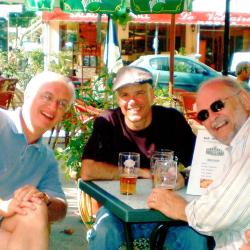Decades of rich Cather experiences inspire Richard Harris to plan for a legacy gift
Willa Cather may not have been Richard Harris’s first choice for a 20th-century American novel seminar paper in 1971, but he’s been choosing her ever since.
Harris was working toward his Ph.D. degree at the University of North Carolina. As with his undergraduate studies, he had originally planned to focus on the 19th-century English historical novel, but he became interested in American literature.
“There were ten people in an American lit seminar, and by the time the list of possible topics got to me, Hemingway, Fitzgerald, Faulkner, Edith Wharton were all taken, so I looked and said, ‘Well, I did read My Ántonia a few years ago and liked it a lot,’” Harris explained.
Harris’s thirty-page assignment turned into an eighty-page paper that he later developed into a dissertation on characterization in Cather’s novels. Since then, he’s continued to study Cather on a variety of topics, presenting at conferences and seminars, contributing to the Willa Cather Review, Cather Studies, and editing the scholarly edition of One of Ours.
“She was a first-rate novelist—an artist, a craftsman. And, like other significant writers, the ideas she deals with are basic human situations, questions, problems, and personalities, and she captures them so well in so many of her characters,” Harris said.
What keeps Harris coming back to Cather is her creativity—how in everything she writes, there’s a combination of her own experiences and outside influences from what she’s read and heard. For example, in A Lost Lady—Harris’ favorite Cather novel—Cather references Bible stories, Hamlet, a short story by Ivan Turgenev, a novel by John Buchan, and a piece of music by Franz Schubert, to name a few of her sources there.
“She was brilliant. I just find it so interesting that Cather’s mind was filled with so much “stuff” that when she got an idea, it was just like going to a shelf and pulling out this and that, and then putting them all together. That kind of creativity is fascinating and very rare. And she does this book after book after book,” Harris said.
Harris, now 80 years old, is a Professor and Director of Humanities at the Webb Institute on Long Island, New York. The selective school specializes in naval architecture and marine engineering. Harris teaches courses ranging from American history and Western Culture (literature in conjunction with classical music and great European and American art) to creative writing and professional presentations. In his 55+ years of college-level teaching, Harris has been able to teach a Cather novel only three times, which makes his involvement with the Willa Cather Foundation all the more meaningful.
Harris has been a regular attendee at the Willa Cather Spring Conference since 1987, and he’s traveled across the country and abroad for International Willa Cather Seminars. “The Cather group was just a terrific group to get into because the people who were established were encouraging and supportive. There was no competition, but a lot of goodwill.”
He still keeps in touch with “The” Mark Madigan and several people he met on his first trip to Hastings and Red Cloud thirty-eight years ago, and says he considers them some of his best friends. Amid the memories of scholarship are audible laughs at moments like receiving a phone call at Red Cloud’s Green Acres Motel from the owner telling him and his friend Bob Thacker to end a conversation, get in their bathtubs, and hang on, as a tornado warning was issued.
“It turned out the tornado didn’t hit Red Cloud, but you know, I think so much of my enjoyment has been sharing those experiences, and not just the papers, but being able to sit around and really go at Cather, or whatever, for hours. It’s just a terrific group of people. Those experiences are certainly one of the many positive things in my life,” Harris said.
Harris’s latest interest has been promoting recognition of the World War I African American U.S. Army infantry regiment known as the Harlem Hellfighters. On September 3, he took part in the presentation ceremony honoring them with a Congressional Gold Medal in the Emancipation Room of the Capitol building. And standing just outside the entrance to the room was, what else?—a statue of Willa Cather.
Harris recently joined the Cather Legacy Society. As he applauds the Foundation’s growing archival collection and preservation work, he shares his hopes that his future gift will support the continuation of events like the annual spring conference for the next generation.
“I think that for English majors and graduate students, for anyone interested in Cather, becoming part of the Cather crowd is simply a terrific experience. I’d like to see other people have the same opportunity that I did. I do think that it’s, if not unique, certainly very special.”
If you would like additional information about the Cather Legacy Society, or if you have named the Willa Cather Foundation as a beneficiary in your estate plans, please contact Ashley Olson, Executive Director, at aolson@willacather.org

